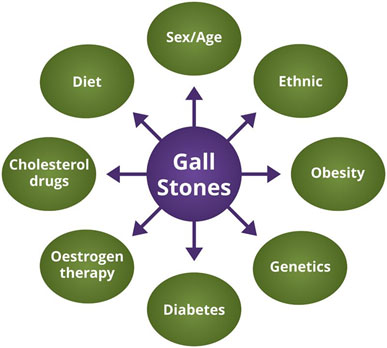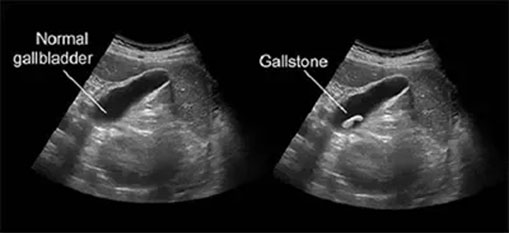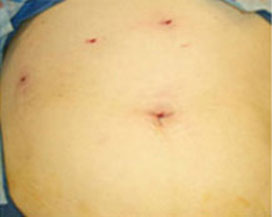Who is at risk?
Increasing age, women, multi-parity, over-weight, diabetes, liver disease and some rare blood disorders increase the risk of gallstones.

Does gallstone problem run in families?
Yes, gallstone disease can run in families and hence high risk families should seek appropriate counselling from a gastroenterologist.
What are the symptoms of gallstones?
The most common symptom is pain in the right side of the upper tummy especially after eating fatty food (biliary colic). Shoulder tip pain and indigestion like symptoms may as well be due to gallstones. Inflammation of the gallbladder (cholecystitis) can occur due to gallstones and such patients are unwell with pain in the tummy, fever and vomiting. Gallstones can block the bile tube and cause jaundice (yellow eyes and skin, dark urine) and life threatening infection of bile tube (cholangitis). They can also cause pancreatitis (inflammation of pancreas gland) and other serious problems like gallbladder perforation.
How to diagnose gallstones?
A detailed history by a specialist followed by blood tests and an ultrasound scan of the tummy is all what is needed usually to diagnose gallstones.

Can gallstones be treated with medicines?
Though there are medicines available to dissolve gallstones, they work only for certain type of stones and the stones recur once treatment is stopped. Hence they are not recommended as standard treatment for gallstones.
What is the best treatment for gallstones?
The current gold standard treatment for symptomatic gallstones is removal of the gallbladder along with the gallstones by key-hole surgery (laparoscopic cholecystectomy)
Is the operation risky?
This is a very safe operation done usually by a key-hole technique under general anaesthesia. When compared to traditional ‘open operation’, key-hole operation to remove the gallbladder is associated with less pain and faster return to normal activity. The patient usually gets discharged home in a day or two. The risk of a major complication is less than 1% in patients having an elective operation.

Will gallstones develop again after surgery?
No. As the gallbladder is removed along with the gallstones, the chance of them developing again is usually not possible.
Is there any long term problem in removing the gallbladder?
There is no long term consequence from removing the gallbladder. Some patients might experience indigestion like symptoms and diarrhoea, but these usually resolve with time.
My scan has shown gallstones, but I don’t have any symptoms. Do I need surgery?
The short answer is no, but it’s better to consult a surgical gastroenterologist who will go through your history and test results and guide you appropriately.

Dr. Muralidharan Parthasarathy
Consultant General, GI and Bariatric Surgeon
Kauvery Hospital, Chennai

-

The strength of a Woman lies in her inherent nature to nurture and nourish…At home or at work …She irons out the creases and makes things look easy. Here’s to all the lovely women, who take each day in their stride by adding their special magic!!
Dr. Renuka Vidyashankar, Quality Asst.Manager
-

The strongest action of a woman is to be herself no matter what others think, love herself and shine amongst those who never believed she could. I’m happy and blessed to be women…Happy women’s day to all the lovely wonderful ladies.
Dr. T. Niveanthini, 2nd Year Emergency Registrar
-

Women’s empowerment is society’s pride. Let’s inspire, support and raise each other.
Dr. Manju Varshaa,
Consultant Family Physician and Cardiac Rehabilitation -

I am really privileged to share my thoughts about women. The empowerment of women is very much improved in our society. Recently Govt of India gave an opportunity to women Air Force soldiers to conduct one day Air Force exhibition. It is very much a proud moment for all women.
Ms. S. Shamim Sultana.
Customer Care Executive, Lab Services. -

No struggle can ever succeed without women
Ms. Ishwarya
Marketing coordinator






